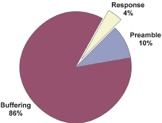

RFID Design Automation


PIs: Alex K. Jones, Marlin Mickle, Tom Cain, Bryan Norman, Jay Rajgopal
The use of Radio Frequency Identification (RFID) technology is expanding rapidly in numerous applications such as logistics, supply chain management, transportation, healthcare and aviation. Due to the variety of the current applications, typical RFID systems use application specific hardware and proprietary protocols. These systems generally have long design times, no tolerance to changes in application or standard, and hence very high system costs.
The typical format for RFID communications between the interrogator and transponder is a set of commands from the interrogator and a corresponding response or action on the transponder. The set of commands varies between the various standards or ad hoc specifications and may be augmented based on the needs of custom applications. In this project we have developed a high-level RFID tag specification methodology and automated design flow for the creation of customized, low-power RFID tags. Our RFID compiler automatically generates an RFID tag controller based on a description of the commands to be implemented.
As part of this project we have also developed several power savings architectural components including a passive transceiver switch for active (battery powered) tags, a smart buffer for reducing controller power consumption in active tags, a layered security approach that leverages features of RFID communications to improve security while limiting additional power requirements, and a technique to increase the amount of non-volatile memory in passive tags with minimal additional power requirements.
This project is supported by the Technology Collaborative (TTC), ADCUS, Inc., RFID Center of Excellence, Tego Inc., and the University of Pittsburgh.
Related Publications
-
•S. Dontharaju, S. Tung, J. T. Cain, L. Mats, M. H. Mickle, and A. K. Jones, “A Design Automation and Power Estimation Flow for RFID Systems,” ACM Transactions on Design Automation for Electronic Systems (TODAES) - in press.
-
•A. K. Jones, S. Dontharaju, S. Tung, L. Mats, P. Hawrylak, R. R. Hoare, J. T. Cain, and M. H. Mickle, “Radio Frequency Identification Prototyping,” ACM Transactions on Design Automation for Electronic Systems (TODAES), Vol. 13, No. 2, April, 2008, pp. 1-21, Article 29, DOI 10.1145/1344418.1344425.
-
•S. Tung and A. K. Jones, “Physical Layer Design Automation for RFID Systems,” in Proc. of the Reconfigurable Architecture Workshop (RAW), 2008
-
•A. K. Jones, R. Hoare, S. Dontharaju, S. Tung, R. Sprang, J. Fazekas, J. T. Cain, M. H. Mickle, “An Automated, FPGA-based Reconfigurable, Low-Power RFID Tag,” Journal of Microprocessors and Microsystems, Vol. 31, No. 2, March 2007, pp. 116-134.
-
•S. Dontharaju, S. Tung, A. K. Jones, L. Mats, J. Panuski, J. T. Cain, and M. H. Mickle, “The Unwinding of a Protocol,” IEEE Communications Magazine - April, 2007.
-
•A. K. Jones, S. Dontharaju, S. Tung, P. Hawrylak, L. Mats, R. Hoare, J. T. Cain, M. H. Mickle, “Passive Active Radio Frequency Identification Tags (PART),” International Journal of Radio Frequency Identification Technology and Applications (IJRFITA) - Vol. 1, No. 1, 2006, pp. 52-73.
•P. J. Hawrylak, L. Mats, J. T. Cain, A. K. Jones, S. Tung, M. H. Mickle, “Ultra Low-power Computing Systems for Wireless Devices,” International Review on Computers and Software (IRECOS), Vol. 1, No. 1, July 2006, pp. 1-10.
•A. K. Jones, R. Hoare, S. R. Dontharaju, S. Tung, R. Sprang, J. Fazekas, J. T. Cain, and M. H. Mickle, “A Field Programmable RFID Tag and Associated Design Flow,” in Proc. of the IEEE Symposium on Field Programmable and Custom Computing Machines (FCCM), 2006.
•A. K. Jones, R. Hoare, S. Dontharaju, S. Tung, R. Sprang, J. Fazekas, J. T. Cain, M. H. Mickle, “An Automated, FPGA-based Reconfigurable, Low-Power RFID Tag,” in Proc. of IEEE/ACM Design Automation Conference (DAC), 2006.





